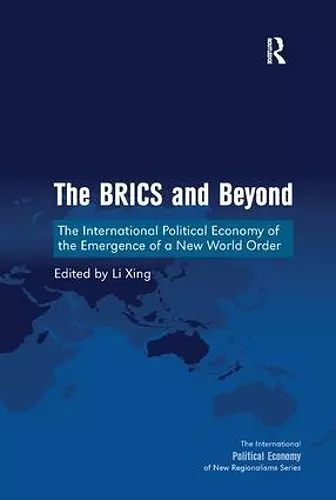The BRICS and Beyond
The International Political Economy of the Emergence of a New World Order
Format:Paperback
Publisher:Taylor & Francis Ltd
Published:30th Jul '18
Currently unavailable, and unfortunately no date known when it will be back
This paperback is available in another edition too:
- Hardback£145.00(9781472428363)

The world is in an era of great transformations. Globalization, transnational capitalism, September 11, the 2008 global financial crises, and the emergence of the ’second world’ in general and the BRICS in particular are characterized by a diffusion of power away from the traditional North Western powers and towards the global South. Such great transformations have reshaped the terrain and parameters of social, economic and political relations both at the national and the global levels and have exerted pressure on the exiting international order in terms of both opportunities and constraints. This new era also urges the need for re-conceptualizing the changing world order especially with regard to one of the core conceptual categories and analytical apparatus in the studies of IR and IPE - hegemony. The world will witness a new era of interdependent hegemony, in which both the existing ’First World’ and the emerging ’Second World’ are intertwined in a constant process of shaping and reshaping the international order in the nexus of national interest, regional orientation, common economic and political agenda, political alliance and potential conflicts. This collection juxtaposes, from different perspectives and approaches, the discussion on the political economy of the emerging world order with a focus on the rising powers.
’We are living in a period of displacement of meridians. Is it a power shift or a paradigm shift? Li Xing maps four crises of the international system, functionality, scope, legitimacy and authority, and in so doing raises a central question about the turn of interests for China and the other BRIC countries: will the future be characterized by systematic conflicts between traditional powers (particularly, the American polarity) and the emerging powers (BRICs)? This book proposes a series of highly interesting reflections on this essential topic in order to understand the challenges of the contemporary world.’ Giuseppe Cocco, Federal University of Rio de Janeiro, Brazil ’In this important and pathbreaking book, editor/author Li Xing and his co-authors expertly examine how the rise of China could transform the U.S.-dominated international order. Xing’s noteworthy conclusion is that China and other emerging nations cannot hope to establish an alternative independent hegemony by effectively replacing the United States as the world’s preeminent power. Since China and the U.S. are, in fact, intertwined in a constant process of shaping and reshaping the global order, Xing argues it is in their mutual interest to deal with their relations strategically and constructively, as their bilateral relations can be best adjusted and balanced under multilateral organizations, such as the G20, under which a new type of cooperative partnership between them can be developed. Coming from a distinguished scholar of international relations theory, who possesses a deep understanding of China’s rise and national aspirations, this conclusion goes far to discredit the misguided popular view that China and the U.S. are inevitably destined to go to war in a future battle for global domination.’ Donald Gross, Centre for Strategic and International Studies, USA
ISBN: 9781138359345
Dimensions: unknown
Weight: 453g
246 pages